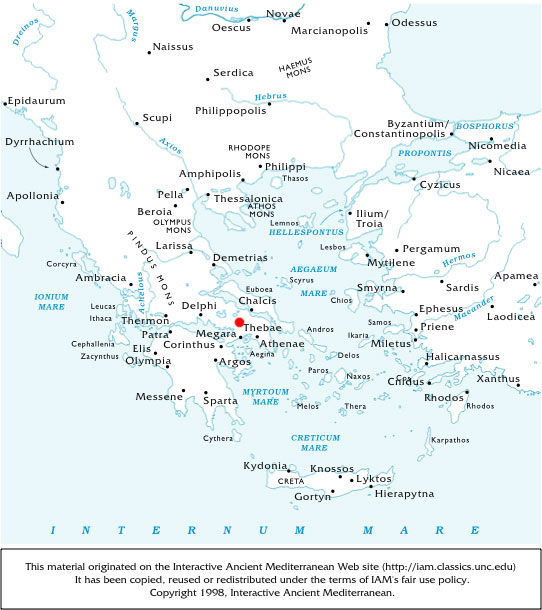Chief city of Boeotia, in ancient Greece. It was originally a Mycenaean city. Thebes is rich in associations with Greek legend and religion (see Oedipus; the Seven against Thebes; Epigoni). Sometime before 1000 B.C., Thebes was settled by Boeotians and rapidly replaced Orchomenus as the region's leading city. At the end of the 6th cent. B.C. it began its struggle with Athens to maintain its position in Boeotia and in Greece.In the Persian Wars, Thebes, motivated by hostility to Athens, sided (480479 B.C.) with the Persians. When the Persians were defeated, Thebes was punished, and only the intervention of Sparta, which saw in the city a balance to the power of Athens, saved it from destruction. Thebes supported Sparta against Athens in the Peloponnesian War but, fearing Spartan territorial ambitions, withdrew this support and joined (394 B.C.) the confederation against Sparta. Sparta was able to place (382 B.C.) a garrison in Thebes, but the city was freed by one of its great generals, Pelopidas, three years later. This freedom was insured (371 B.C.) by the Spartan defeat at Leuctra by the Theban Epaminondas.
Thebes joined Athens against Philip II of Macedon and shared in the defeat at Chaeronea (338 B.C.). A revolt at Thebes caused Alexander the Great to attack and destroy (336 B.C.) the city. Cassander rebuilt Thebes c.315 B.C., but it never regained its former greatness. The modern Thívai occupies the site of the Theban acropolis, part of which still survives. There are also remains of the prehistoric city and the temple of Ismenian Apollo. (The Columbia Encyclopedia, Sixth Edition, 2001)
